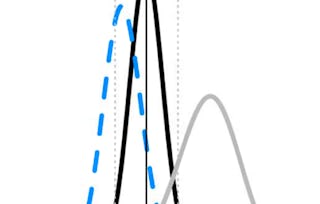Statistical inference is the process of drawing conclusions about populations or scientific truths from data. There are many modes of performing inference including statistical modeling, data oriented strategies and explicit use of designs and randomization in analyses. Furthermore, there are broad theories (frequentists, Bayesian, likelihood, design based, …) and numerous complexities (missing data, observed and unobserved confounding, biases) for performing inference. A practitioner can often be left in a debilitating maze of techniques, philosophies and nuance. This course presents the fundamentals of inference in a practical approach for getting things done. After taking this course, students will understand the broad directions of statistical inference and use this information for making informed choices in analyzing data.

Statistical Inference
Ends soon: Gain next-level skills with Coursera Plus for $199 (regularly $399). Save now.

Statistical Inference
This course is part of multiple programs.



Instructors: Brian Caffo, PhD
187,982 already enrolled
Included with
(4,451 reviews)
What you'll learn
Understand the process of drawing conclusions about populations or scientific truths from data
Describe variability, distributions, limits, and confidence intervals
Use p-values, confidence intervals, and permutation tests
Make informed data analysis decisions
Skills you'll gain
Details to know

Add to your LinkedIn profile
See how employees at top companies are mastering in-demand skills

Build your subject-matter expertise
- Learn new concepts from industry experts
- Gain a foundational understanding of a subject or tool
- Develop job-relevant skills with hands-on projects
- Earn a shareable career certificate

There are 4 modules in this course
This week, we'll focus on the fundamentals including probability, random variables, expectations and more.
What's included
10 videos11 readings1 assignment5 programming assignments
We're going to tackle variability, distributions, limits, and confidence intervals.
What's included
10 videos4 readings1 assignment3 programming assignments
We will be taking a look at intervals, testing, and pvalues in this lesson.
What's included
11 videos5 readings1 assignment3 programming assignments
We will begin looking into power, bootstrapping, and permutation tests.
What's included
9 videos4 readings1 assignment3 programming assignments1 peer review
Earn a career certificate
Add this credential to your LinkedIn profile, resume, or CV. Share it on social media and in your performance review.
Instructors

Offered by
Explore more from Probability and Statistics
 Status: Free Trial
Status: Free TrialArizona State University
 Status: Preview
Status: PreviewEindhoven University of Technology
 Status: Free Trial
Status: Free TrialDuke University
 Status: Free Trial
Status: Free TrialUniversity of Amsterdam
Why people choose Coursera for their career




Learner reviews
4,451 reviews
- 5 stars
57.69%
- 4 stars
22.98%
- 3 stars
9.97%
- 2 stars
4.56%
- 1 star
4.78%
Showing 3 of 4451
Reviewed on Aug 14, 2016
Outstanding material. You can scale the difficulty and depth on the subject as you wish. Great source and references. (Recommend seeing the videos at 1.5 x speed though).
Reviewed on May 22, 2017
Excellent course. After completion, I really feel like I have a great grasp of basic inferential statistics and this course introduced ideas that I had not even considered before.
Reviewed on May 10, 2020
This course explores many key statistical concepts, however you are expected to extend your learning beyond the course in order to fill in any foundational gaps in statistics.

Open new doors with Coursera Plus
Unlimited access to 10,000+ world-class courses, hands-on projects, and job-ready certificate programs - all included in your subscription
Advance your career with an online degree
Earn a degree from world-class universities - 100% online
Join over 3,400 global companies that choose Coursera for Business
Upskill your employees to excel in the digital economy
Frequently asked questions
To access the course materials, assignments and to earn a Certificate, you will need to purchase the Certificate experience when you enroll in a course. You can try a Free Trial instead, or apply for Financial Aid. The course may offer 'Full Course, No Certificate' instead. This option lets you see all course materials, submit required assessments, and get a final grade. This also means that you will not be able to purchase a Certificate experience.
When you enroll in the course, you get access to all of the courses in the Specialization, and you earn a certificate when you complete the work. Your electronic Certificate will be added to your Accomplishments page - from there, you can print your Certificate or add it to your LinkedIn profile.
Yes. In select learning programs, you can apply for financial aid or a scholarship if you can’t afford the enrollment fee. If fin aid or scholarship is available for your learning program selection, you’ll find a link to apply on the description page.
More questions
Financial aid available,
¹ Some assignments in this course are AI-graded. For these assignments, your data will be used in accordance with Coursera's Privacy Notice.

